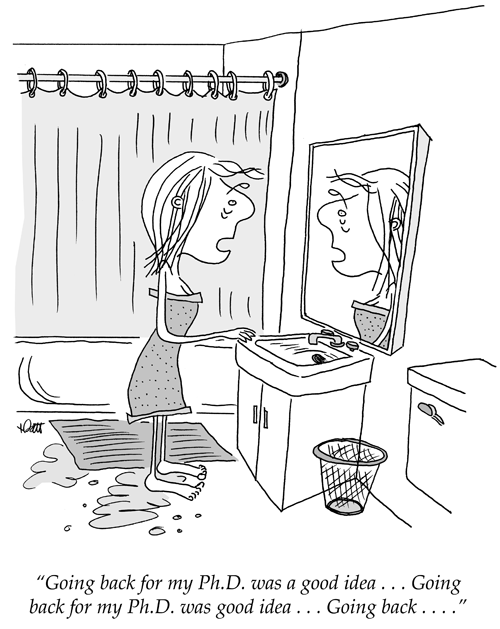Dave Sherman recently posted an interesting reflection on higher education called PhDo or PhDon’t? He considers pursuing a PhD but questions his motivations.

It stirred up some of my own stuff that has been lying under the surface lately around my own education. I went back to school 11 months ago, and I am questioning that decision. For real. Here is the comment I wrote in response.
Very timely post for me. I am in the first year of a PhD program and am re-evaluating if it is really what I want to do. Am I doing it because I like the idea of it? or because it is right for me? Not sure.
I do know that I work full time, with challenging students (which ones aren’t, really?) at a high school from 7 to 5 most days, and study part-time. Between those 2 things I do not have much time for anything else. Luckily I do love teaching and learning! But there is little balance with other activities (exercise, painting, personal reading, family…).
Also, I am finding the whole methodological approach of the PhD program I am in to be …. ugh. I am not interested in stats. Really. I am not interested in isolating variables, in considering things in isolation from anything else. I am interested in uncovering stories and relationships and I do not think that can be done in isolation. So maybe what I need to do is look for another program, one where I will feel more at home.
So…those are my 2 cents. Consider work/life balance, and consider the program that is the right fit. That’s where I am now. Luckily I go to school in Canada, where the fees are not outrageous, so I can afford to spend some time figuring out where I fit.
Whatever choice you make, make it right for you.
So. How do I take my own advice? Where do I go from here? These are questions that I am left with. Jon Becker wrote about the difference between the Ed.D and the PhD in his comment to Dave. Perhaps an Ed.D is where I need to look. Or perhaps I need to look outside of Education.
Things I know.
- I love to research, to learn.
- I hate to do it around things that do not interest me. In high school and CEGEP I receive As or Fs, not much in between, and directly related to interest. By the PhD level, I was expecting to not have to do that anymore (spend time learning things that don’t interest me).
- I love to teach, to work with kids.
- I get energy from BOTH being with kids and research – my own learning.
Oddly, though I am working in a new program and in the first year of a PhD, I feel stagnant. What the heck is up with that?

Leave a Reply